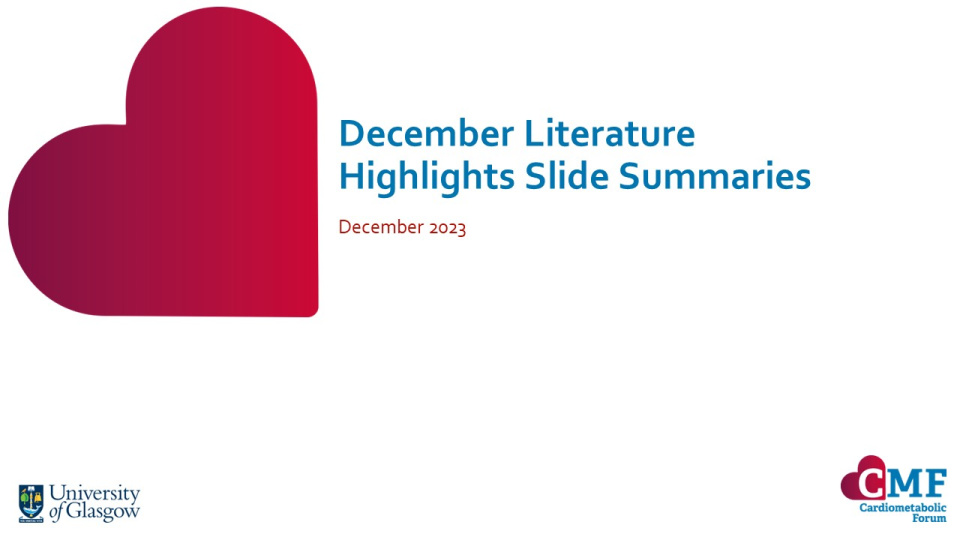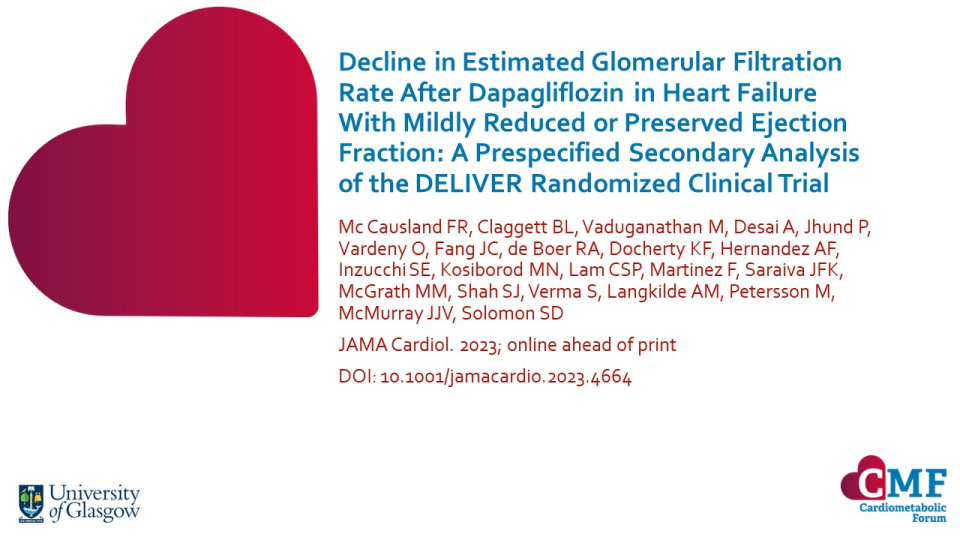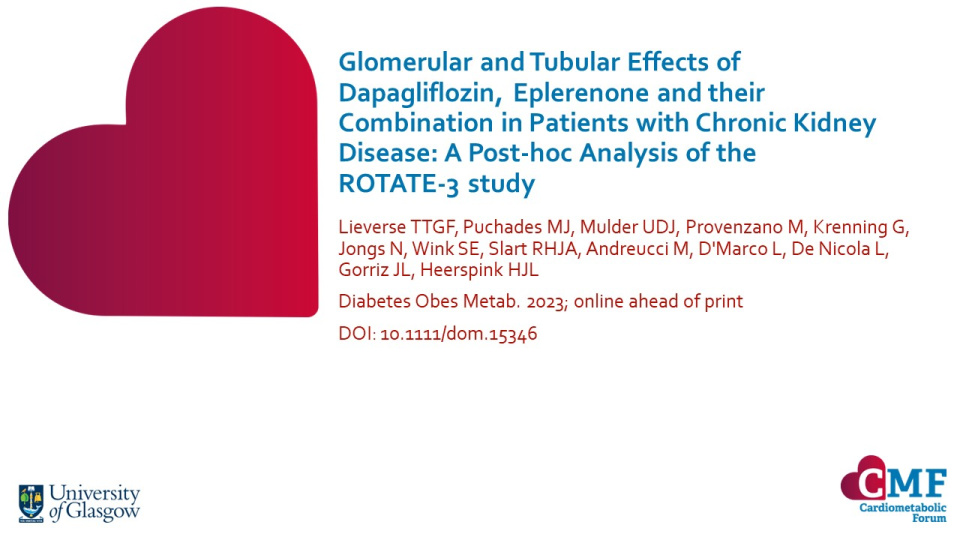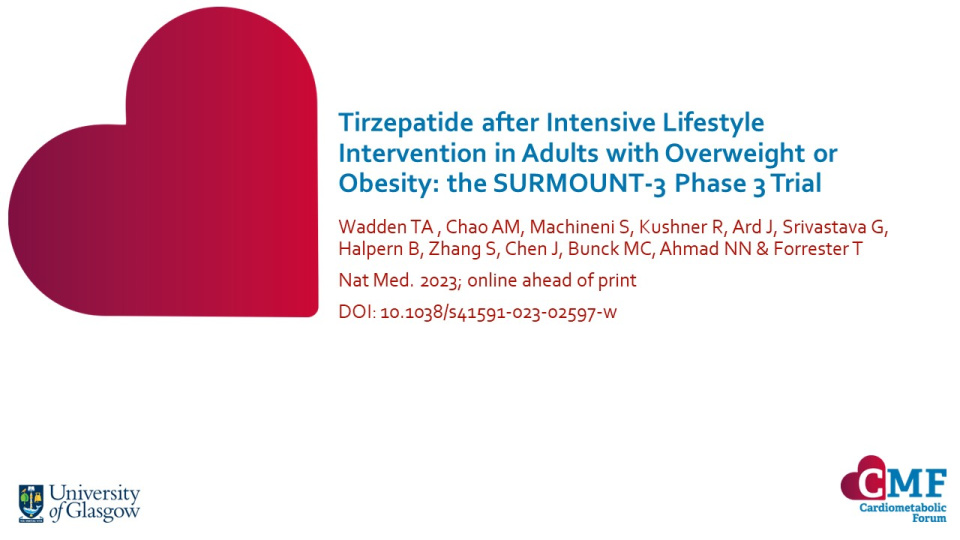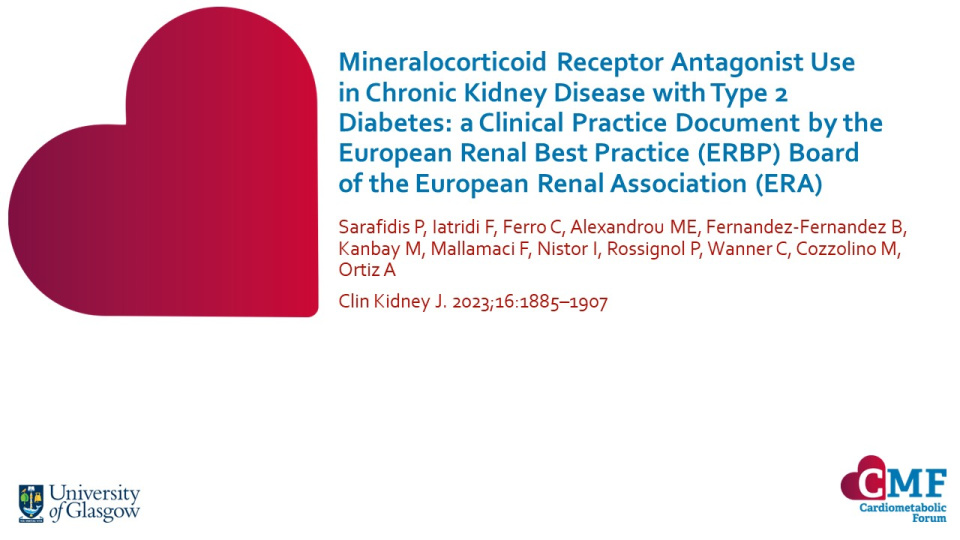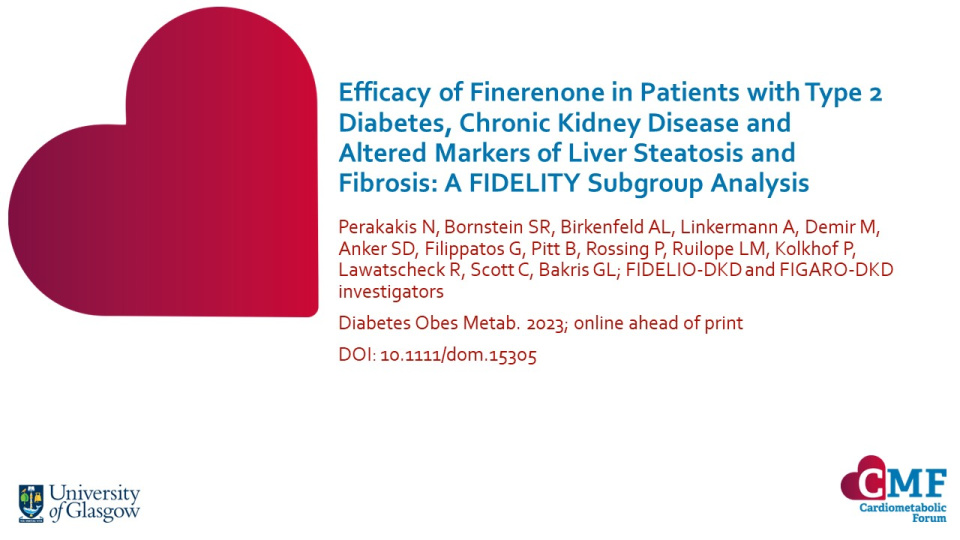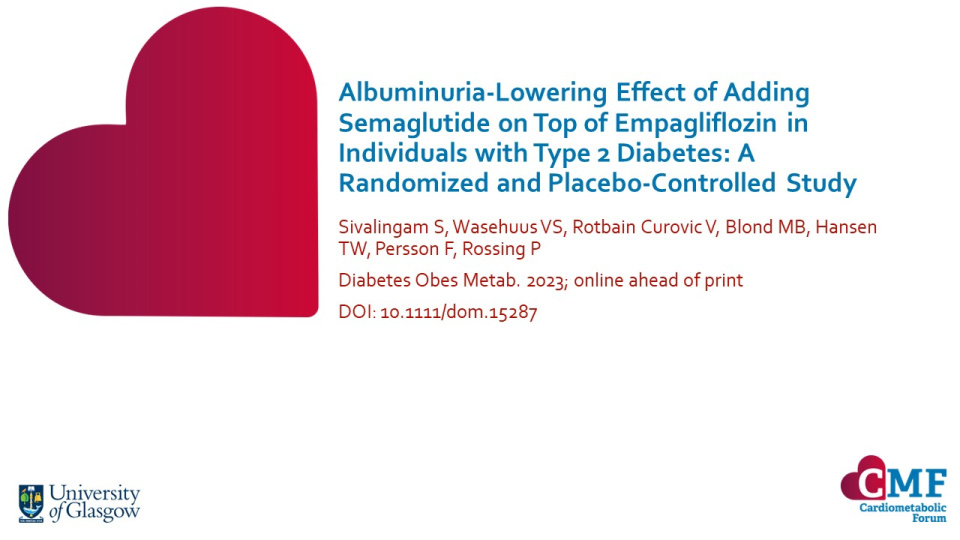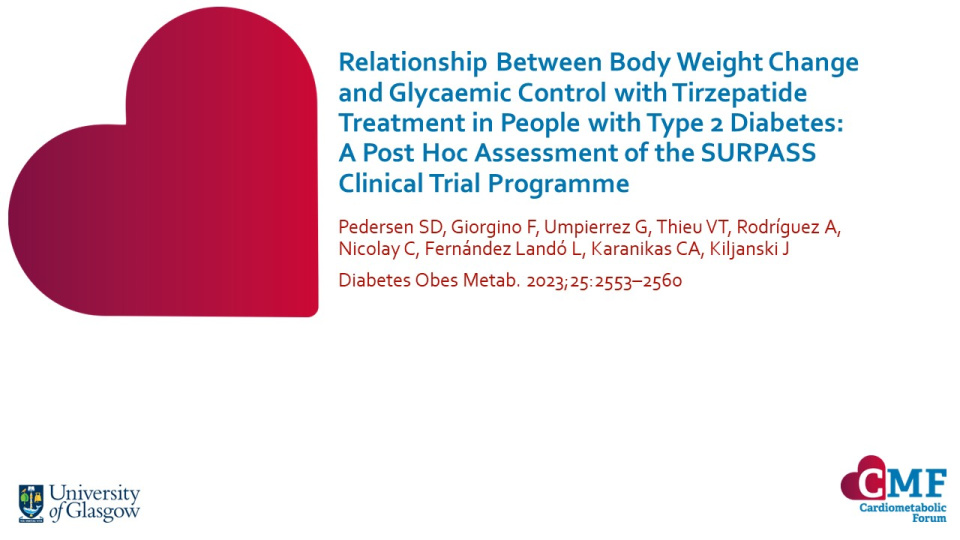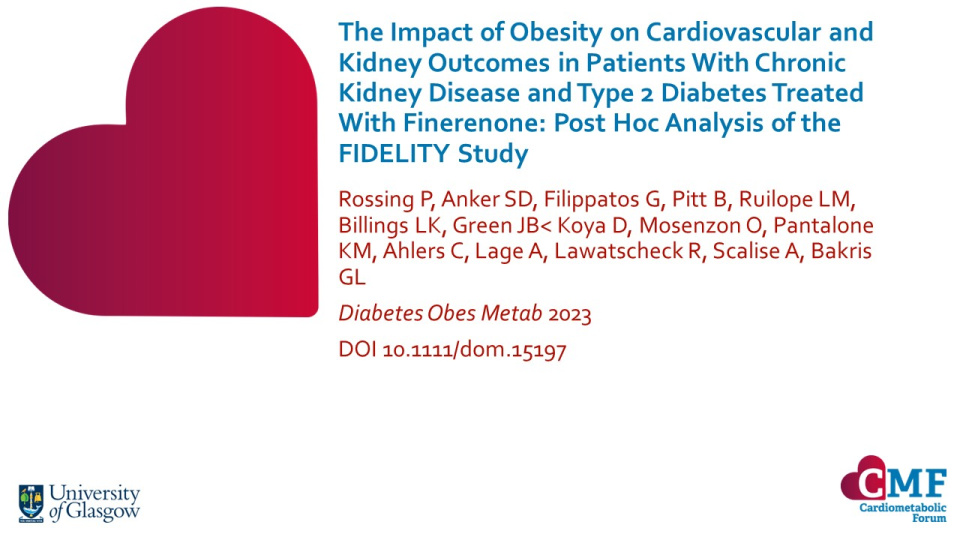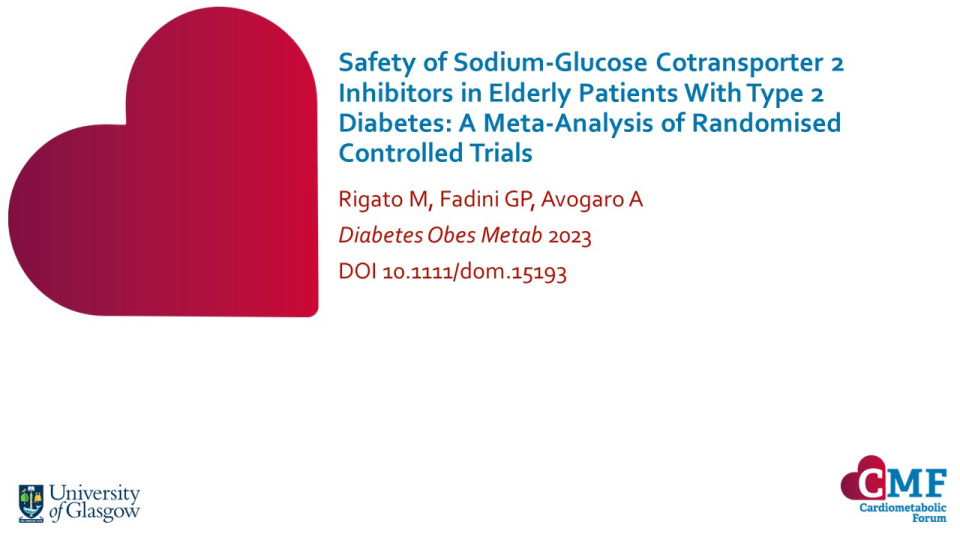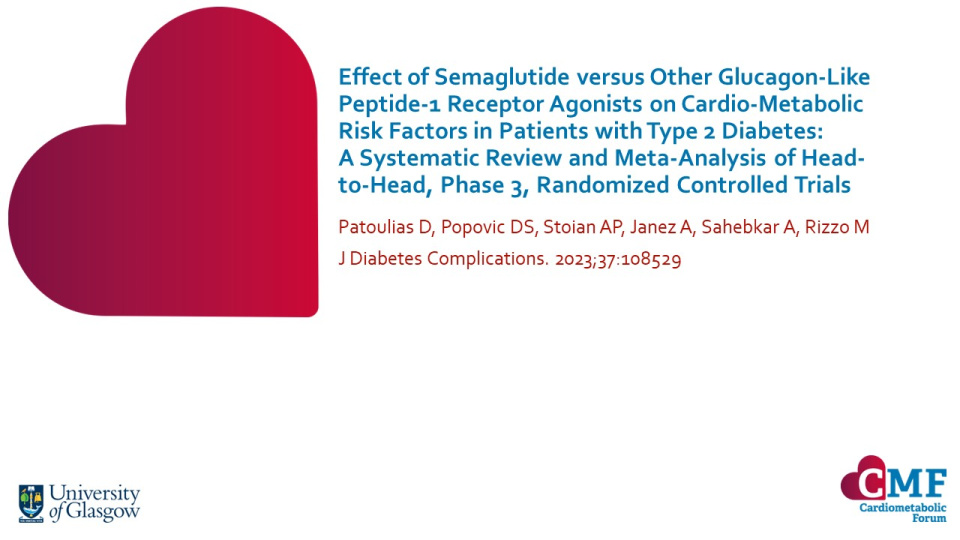Publications
Stay up to date with our literature reviews which are curated by experts to feature the most important publications released each month. Explore our publications for access to concise summary slides for your own use.
Decline in Estimated Glomerular Filtration Rate After Dapagliflozin in Heart Failure With Mildly Reduced or Preserved Ejection Fraction: A Prespecified Secondary Analysis of the DELIVER Randomized Clinical Trial
JAMA Cardiol. 2023; online ahead of print DOI: 10.1001/jamacardio.2023.4664
An initial decline in eGFR often occurs after initiating a SGLT2i and has been observed in patients with diabetes, CKD and HF. A prespecified analysis of DELIVER evaluated the magnitude and frequency of an initial decline in eGFR (within the first month) and its association with CV and renal outcomes in 5,788 patients with HFpEF or HFmrEF.
Keywords:
Glomerular and Tubular Effects of Dapagliflozin, Eplerenone and their Combination in Patients with Chronic Kidney Disease: A Post-hoc Analysis of the ROTATE-3 Study
Diabetes Obes Metab. 2023; online ahead of print DOI: 10.1111/dom.15346
The ROTATE-3 cross-over trial in 46 adults with CKD and urinary albumin excretion ≥100 mg/24 h showed that dapagliflozin combined with eplerenone led to robust additive reductions in albuminuria compared with either agent alone. This post-hoc analysis aimed to characterise the effects of dapagliflozin, eplerenone and the combination on markers of glomerular and tubular function to better understand the mechanisms responsible for albuminuria lowering.
Keywords:
Tirzepatide after Intensive Lifestyle Intervention in Adults with Overweight or Obesity: the SURMOUNT-3 Phase 3 Trial
Nat Med. 2023; online ahead of print DOI: 10.1038/s41591-023-02597-w
The use of antiobesity medications following intensive lifestyle intervention has been proposed as a strategy to induce additional weight reduction (which may be needed to achieve optimal control of obesity-related complications) or, at a minimum, to prevent weight regain. The effects of tirzepatide, the dual GIP and GLP-1RA, on weight reduction after successful intensive lifestyle intervention are unknown.
Keywords:
Mineralocorticoid Receptor Antagonist Use in Chronic Kidney Disease with Type 2 Diabetes: A Clinical Practice Document by the European Renal Best Practice (ERBP) Board of the European Renal Association (ERA)
Clin Kidney J. 2023;16:1885–1907
Patients with CKD and T2D are at high risk of both developing kidney failure and of CV events. With RAS blockers, residual risk of CKD progression remains high and no significant reduction in CV events and mortality has been seen in major studies in patients with CKD and T2D. Steroidal MRAs have been shown to reduce albuminuria in individuals on RAS monotherapy, but widespread clinical use is limited by the risk of hyperkalaemia and the absence of trials with hard renal outcomes. In recent years, non-steroidal MRAs have received increasing interest due to their better pharmacological profile, particularly finerenone, which effectively reduced CKD progression and CV outcomes in participants with T2D in Phase 3 trials.
Keywords:
Efficacy of Finerenone in Patients with Type 2 Diabetes, Chronic Kidney Disease and Altered Markers of Liver Steatosis and Fibrosis: A FIDELITY Subgroup Analysis
Diabetes Obes Metab. 2023; online ahead of print DOI: 10.1111/dom.15305
This post hoc subgroup analysis from FIDELITY investigated the effect of finerenone on liver function, cardiovascular and kidney composite outcomes in patients with CKD and T2D, stratified by their risk of liver steatosis, inflammation and fibrosis.
Keywords:
Albuminuria-Lowering Effect of Adding Semaglutide on Top of Empagliflozin in Individuals with Type 2 Diabetes: A Randomized and Placebo-Controlled Study
Diabetes Obes Metab. 2023; online ahead of print DOI: 10.1111/dom.15287
The proposed different mechanisms of SGLT2i and GLP-1RAs indicate that combination therapy may have additive or synergistic effects on the kidneys. This placebo-controlled, double-blind, parallel-group study investigated the effect on albuminuria of adding semaglutide to ongoing treatment with empagliflozin compared with empagliflozin alone in 60 individuals with T2D and albuminuria.
Keywords:
Relationship Between Body Weight Change and Glycaemic Control with Tirzepatide Treatment in People with Type 2 Diabetes: A Post Hoc Assessment of the SURPASS Clinical Trial Programme
Diabetes Obes Metab. 2023;25:2553–2560
Given that improvements in glycaemic control may be linked to both weight-independent and weight-dependent mechanisms, it is of interest to understand how changes in glycaemia and weight seen with tirzepatide are related. This post hoc analysis assessed the relationship between HbA1c and body weight reductions with tirzepatide treatment (5, 10 or 15 mg) across the SURPASS clinical trial programme.
Keywords:
The Impact of Obesity on Cardiovascular and Kidney Outcomes in Patients with Chronic Kidney Disease and Type 2 Diabetes Treated with Finerenone: Post hoc analysis of the FIDELITY Study
Diabetes Obes Metab. 2023 doi Epub ahead of print : 10.1111/dom.15197
Patients with obesity may benefit more from treatment with mineralocorticoid receptor antagonists given their higher levels of circulating aldosterone and therefore potentially higher levels of MRs in visceral fat. The aim of this analysis was to assess the effect of finerenone on the risk of cardiovascular and kidney outcomes in patients with chronic kidney disease and type 2 diabetes, with and without obesity.
Keywords:
Safety of Sodium-Glucose Cotransporter 2 Inhibitors in Elderly Patients with Type 2 Diabetes: A Meta-Analysis of Randomised Controlled Trials
Diabetes Obes Metab 2023 DOI 10.1111/dom.15193
SGLT2is are effective in preventing adverse outcomes of heart failure and chronic kidney disease, which are highly prevalent in the elderly. While SGLT2is are generally well tolerated, elderly patients may be more susceptible to developing AEs reported with this class of drug, such as infections, fracture, and AKI. Clinical experience with SGLT2is in the elderly and very elderly is limited.
Effect of Semaglutide versus Other Glucagon-Like Peptide-1 Receptor Agonists on Cardio-Metabolic Risk Factors in Patients with Type 2 Diabetes: A Systematic Review and Meta-Analysis of Head-to-Head, Phase 3, Randomized Controlled Trials
J Diabetes Complications. 2023;37:108529 DOI: 10.1016/j.jdiacomp.2023.108529
GLP-1RAs vary in their abilities to control glycaemia, reduce body weight and improve other cardiometabolic risk factors. A recent systematic review and meta-analysis assessed the efficacy and safety of semaglutide compared with other GLP-1RAs in head-to-head phase 3 RCTs in adults with T2D.

